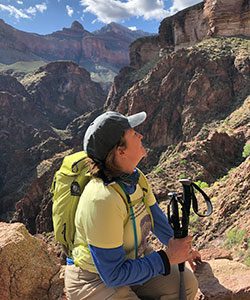Healing Through Physical Activity: Our Journey to End Overdose
by Jean Ragalie-Carr, AFHK Board Member
 I am proud to be a founding and long-time board member of Action for Healthy Kids. I have always believed physical fitness is vital for a healthy lifestyle for people of all ages, and I tried to instill this in my three children as they grew up. To me, exercise is a therapeutic way to work things out mentally, spiritually and physically. It is an integral part of my lifestyle and my personal and professional priorities.
I am proud to be a founding and long-time board member of Action for Healthy Kids. I have always believed physical fitness is vital for a healthy lifestyle for people of all ages, and I tried to instill this in my three children as they grew up. To me, exercise is a therapeutic way to work things out mentally, spiritually and physically. It is an integral part of my lifestyle and my personal and professional priorities.
Last year, my family and I experienced a grave tragedy: the death of my 30-year-old son (my eldest), Bud, from a drug overdose. He struggled with addiction for many years and succumbed to it on June 15, 2018—five days after his 30th birthday. It is through faith, family and fitness that I have been able to survive this tragedy and possibly even thrive. It has not been easy, but it has been transformative, deeply sad and uniquely rich. The love of so many people and a good dose of exercise have made it that way. Bud was a fitness buff, too; it gave him relief and even hope at times. It is powerful. I wish my son could know how much he was loved, but I’m not sure he did. For my family and me, the love of God, family, friends, colleagues and even strangers has been overflowing and ever-present this year.
Upon his death, we decided we would be very open about the cause and the facts leading up to it. It was scary because of the stigma and judgments we thought people might make. Instead, it turned out to be liberating, therapeutic and helpful to others. We began a campaign against addiction—we studied the disease; read books; and talked to researchers, politicians, celebrities, recovery professionals and other parents of addicts. We then shared our story and educated people about the disease. We shared real recovery stories and other solutions. We did media interviews, and we talked to the U.S. Surgeon General and embarked on a public education campaign.
To our surprise, others joined our cause in a variety of ways. Many more people are doing their own tributes; they are speaking out, taking action and raising money to address the tragedy of the opioid epidemic facing this country. My colleagues, friends and families encouraged us, listened, spread the word, told us personal stories of struggles with the disease and shared stories of hope and recovery. Support was overwhelming, uplifting and unwavering!
With a lot of support, we decided to pay tribute to my son by helping to raise over $21,000 to build a gym at a recovery home called Serenity House in the Chicagoland area. Although my son never attended this recovery home, I served on the board of directors to give back during his struggle. My family and I decided we would do something hard, different and extreme to honor his life and struggle, to bring light to the opioid crisis and focus on solutions to end overdose. We announced that we would be hiking the Grand Canyon from rim to rim to mark the one-year anniversary of Bud’s death and bring light to the devastating and isolating disease of addiction. Bud’s dad decided he would join the effort by participating in an Ironman half-triathlon.
After eight months of planning and training, we made our trek across the Grand Canyon on May 20-21, 2019. It was a long and winding road: 24 miles up, down and around with a one-mile elevation change! It was like a journey to the center of the earth. But this was a “Trek Against Addiction,” a tribute to my late son. A journey of love. A path of ups and downs, deep valleys, cliffs and turns like Bud’s very own struggle—not always seeing the way but still believing and going His way through faith. Although we could not save my son, perhaps we could help other people and families from this devastating and isolating disease.
This trek is over but the journey is not. Like the trail in the Grand Canyon, it’s one step at a time. We can do this! Together we can end overdose and stop the stigma.
Categories: Around AFHK, Physical Activity, PE, & Play